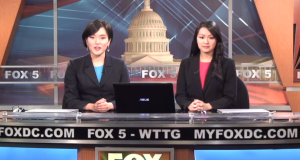In-soo Park sits in a bustling food court in the heart of Los Angeles’ Koreatown with a newspaper spread out over his table. The black-and-white print isn’t filled with stories from the city around him but of news 6,000 miles away.
And the paper isn’t in English.
The 63-year-old retired shopkeeper has lived in the City of Angels for 18 years, but he still prefers to get his news in the language of his home country.
“How else would I learn about what’s happening there?” He asked in Korean.
Like so many Asian Americans, Park relies heavily on ethnic media outlets rather than mainstream English-language sources for political and international news. Roughly half of Asian American adults will go to at least one Asian-language source — whether in print, television, radio or online — according to the most recent National Asian American Survey.
The reliance on an Asian-language source is often a conscious choice, a way to stay better connected to a cultural heritage and to learn about relevant issues that might otherwise be neglected in traditional local media. But there are some publications trying to find a small niche that gives a nod to where Asian Americans came from while looking ahead to where they’re going.
Specifically for Korean Americans, receiving news in another language other than English isn’t an issue of fluency or literacy. In the 2012 NAAS, only one in five Korean American respondents chose to be interviewed in Korean. Park can speak English and Spanish along with Korean. But the majority of Korean Americans still opt to go to a Korean-language outlet for their news.
“More than two out of three Korean Americans rely on a Korean or Korean-language media source for their political and international news,” said Taeku Lee, a political science and law professor at the University of California, Berkeley, who co-wrote the survey.
It isn’t because Korean outlets are more equipped to report on Korean news because of their proximity or cultural understanding. As events unfolded during the April 16 sinking of the Sewol ferry off the coast of South Korea — a national tragedy that claimed the lives of 304 passengers, the majority of whom were high school students — bilingual Korean Americans, like 28-year-old Phillip Lee, saw how Korean and Western coverage could delineate and tell very different narratives.
Lee, a U.S.-born second-generation Korean American who moved to Seoul for work in 2012, said the Korean media had a reporting bias that was more concerned with culpability rather than human interest.
“Of course they were worried about the victims, but one thing they were really focused on was who was to blame,” Lee said. “They were talking about insurance policies, not just for the victims’ lives, but for their cellphones or the cars that were on the boat. All the victims weren’t even declared dead yet.”
Lee described the country’s round-the-clock coverage of the Sewol disaster as South Korea’s “9/11.” The Korean media left no stone unturned, pitting public opinion in Korea and across the diaspora against the Korean government. President Park Geun-hye’s approval ratings plummeted to 40 percent largely because the public blamed her administration for its inadequate response, a fallout that led Prime Minister Jung Hong-won to submit his resignation. The media’s obsession also sparked a nationwide hunt for the billionaire who owned the ferry, Yoo Byung-eun, whose decomposing body was found in a plum field amid bottles of soju, or rice wine, in June. Authorities were unable to determine a cause of death.
With a government found incompetent and a growing suspicion of class-based elitism, the Sewol sinking showed how ethnic media sources can heavily influence perspectives that lie outside their borders. It’s an authoritative voice that comes at a risk, according to Kyeyoung Park, a UCLA professor of anthropology and Asian American studies.
“Korean American immigrants almost dangerously rely on what is being reported out of Korea,” Park said. “Ethnic media can be responsible for almost shaping the opinions and values of new immigrants. On the other hand, ethnic media is crucial and can be an educational tool for information.”
Many Korean Americans prefer Korean news coverage to be from Korean sources because it allows them to hold a direct connection to their heritage.
But Park, who cited the Korea Times, the Los Angeles Times and the Wall Street Journal as her news sources, said she wished there was more of a demand for local news that highlights issues affecting the Korean American community. The Korea Times has a section in its pages called mijupan, or news “published in the U.S.,” but coverage is limited.
There are, however, small pockets across the country that have found a way to bring Asian American issues to the forefront through hyperlocal journalism. And they’re being reported in English.
Those publications include China Daily and Asian Fortune, a monthly magazine serving more than 800,000 readers in the Washington area. Asian Fortune tries to define the Asian American experience in its coverage rather than focusing on new immigrant stories. Jenny Chen, editor and digital strategy coordinator, said printing in English opens the magazine’s appeal to a larger community than that of an ethnic media source.
“Our publication is pan-Asian,” Chen said. “Third and fourth generations identify as Asian American more than their parents do because they feel more connected to other Asians regardless of where they’re from.”
The dependence on ethnic media sources will most likely wane as English-first generations grow. Only 14 percent of U.S.-born Asian Americans said they could carry a conversation in their ancestral language, according to a 2012 Pew Research Center report.
But until then, old-timers like Park will keep on trucking with their Korean paper in tow.
A headline declaring conservative Saenuri Party’s victory in the parliamentary by-elections catches Park’s eye. As he reads, a frustrated growl and sharp “tsk” — typical Korean exclamations of frustration — escape under his breath.
“It’s not looking good,” he says in Korean.
Follow @MelissahYang on Twitter.
 VOICES Publishing from the AAJA National Convention
VOICES Publishing from the AAJA National Convention






